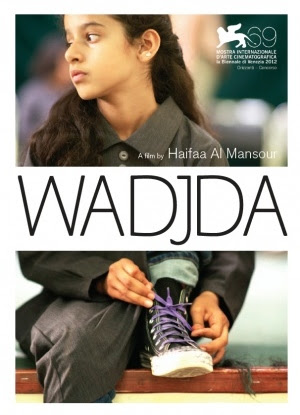Friday, September 20, 2013
Wadjda (وجدة)
 Saudi
Arabia may be best known for its
magnificent Mecca
(مكة), for its wealth generated
from its oil reserve, and for its repressive social code on
women. But it might be less known for banning cinema and
having no movie theater in the entire country. That status
quo makes the first movie filmed entirely inside Saudi
Arabia nothing short of an extraordinary milestone, and this
first movie is written and directed by the first female
Saudi filmmaker, no less. The filmmaker is Egypt/Australia
educated writer/director Haifaa Al
Mansour (هيفاء
المنصور). The
movie is her captivating feature directorial
debut "Wadjda"
(وجدة | Saudi Arabia/Germany
2012 | in Arabic | 98 min.), which has been receiving
many awards
at
film
festivals around the globe. It tells a heartfelt story
about a ten-year-old girl's quest of pursing a bicycle, but
she faces obstacles every step in the way because women are
subject to extremely rigid conduct rules in Saudi Arabia.
Saudi
Arabia may be best known for its
magnificent Mecca
(مكة), for its wealth generated
from its oil reserve, and for its repressive social code on
women. But it might be less known for banning cinema and
having no movie theater in the entire country. That status
quo makes the first movie filmed entirely inside Saudi
Arabia nothing short of an extraordinary milestone, and this
first movie is written and directed by the first female
Saudi filmmaker, no less. The filmmaker is Egypt/Australia
educated writer/director Haifaa Al
Mansour (هيفاء
المنصور). The
movie is her captivating feature directorial
debut "Wadjda"
(وجدة | Saudi Arabia/Germany
2012 | in Arabic | 98 min.), which has been receiving
many awards
at
film
festivals around the globe. It tells a heartfelt story
about a ten-year-old girl's quest of pursing a bicycle, but
she faces obstacles every step in the way because women are
subject to extremely rigid conduct rules in Saudi Arabia.
The film's opening scene immediately tells us that ten-year-old girl Wadjda (Waad Mohammed) is different—unlike the rest of her classmates who all wear dress shoes to school, she wears graffiti covered Converse, and she is not very good at reciting the Quran. She is a street-smart rebellion, both in and out of school. She makes her own music tapes and plays with a neighborhood boy Abdullah (Abdullrahman Al Gohani), who always rides a bicycle around.
Naturally, she wants a bicycle too so she can race with Abdullah.
That's certainly out of the question in a society where women are forbidden to be seen or even heard by other men, as a commanding school principle Ms. Hussa (Ahd) teaches. Besides, Wadjda's mother (Reem Abdullah) doesn't have the money to get her a bicycle either, and she is preoccupied by trying to please her absent husband (Sultan Al Assaf) who is about to take in a second wife.
That doesn't deter Wadjda's strong determination. She uses her charming wit to raise money herself. During the process, it seems impossible for her to avoid the conflict between her free will and the strict rules that Saudi society imposes upon women.
By using all Saudi actors and filming entirely inside Saudi Arabia, director Haifaa Al Mansour convincingly tells an authentic story in the film. Perhaps for the first time, she shows little seen ordinary Saudi women's daily life and Saudi education system for girls. While it's appalling and even comical when we hear how the principle lectures the girls, it's even more depressing to realize that it comes from sincerely good intention. Everybody seems kind and nice in the film, even the principle. Yet, we sense how Wadjda feels suffocating and longs for freedom.
Despite the infancy stage of Saudi film industry, many of the actors deliver a remarkable performance under the direction of Haifaa Al Mansour. If women are not supposed to be hear and seen by other non-family male in Saudi Arabia, these actresses in the film are truly courageous and deserve our deep appreciation for creating these mesmerizing characters.
Although the motivation for Wadjda's pursuit is as simple as an innocent desire to have a bicycle, it becomes an enormous challenge in a society like Saudi Arabia. Her stubborn effort in reaching that goal reminds me another wonderful Iranian film, "Children of Heaven" (بچههای آسمان 1997), about a similar aged boy longing for a pair of shoes to go to school. They share a similar—once their little minds are set, there is no turning back.
"Wadjda," a Sony Pictures Classics release, opens on Friday, September 20, 2013 in San Francisco Bay Area.
